
 Flash News
Flash News
The French footballer is declared the "player of the season" in the Champions League
Flames engulf the Darëzeza forest massif in Fier
Serious accident in Vlora, vehicle collides with two young people, one of them dies
Durrës Border Police find two tourists on a speedboat, one dead, the other in serious condition
Car hits motorbike, 25-year-old dies in Bilisht
KRIIK releases preliminary findings for May 11: Intimidation and vote buying continued, institutions tolerated abuse of state resources
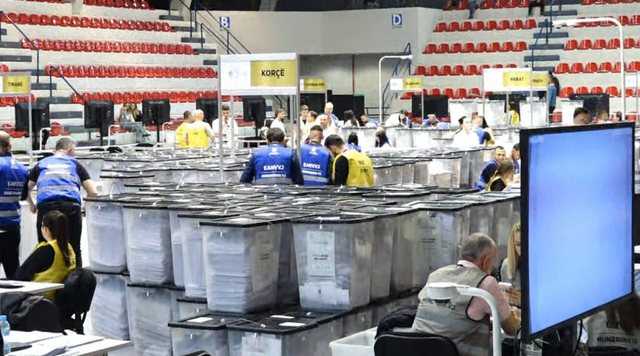
The Coalition for Reform, Integration and Consolidated Institutions (CRIIK) has published preliminary findings and conclusions from the partial monitoring of the May 11 election process.
According to KRIIK, the electoral process was characterized by deep polarization, with no shortage of clashes between political parties.
According to KRIIK's findings, the State Election Commissioner and other institutions were tolerant of the abuse of state resources.
PRELIMINARY CONCLUSIONS
The elections were held in a political context characterized by deep polarization and mutual distrust between political parties. Political conflict has been manifested continuously since the 2021 parliamentary elections, including violent clashes in the Assembly in late 2023 and the continued exclusion of opposition MPs from parliamentary sessions.
The electoral reform that lasted over two and a half years failed to bring significant changes to the electoral legal framework, being characterized by a lack of transparency, delays and deadlock. KRIIK assesses that this failure is a direct result of the lack of political will for substantial changes, dialogue and compromise from the main political parties.
In July 2024, the Assembly adopted several important but minimalist amendments to the Electoral Code, without undergoing the legal process of public consultation. Some of these amendments are considered positive, notably the elimination of the threshold for independent candidates, the ban on party leaders from running in some constituencies, and the specifications for external voting. In February 2025, the Electoral Code was amended again to ensure sufficient time for external votes to arrive on time. Last-minute changes undermined the stability and predictability of the legal framework.
The legal framework can generally guarantee democratic elections if fully implemented. However, issues such as preventing the use of state resources, vote buying, voter intimidation, ensuring the secrecy of the vote, depoliticizing the election administration, and transparency of campaign financing remain unaddressed.
The Regulatory Commission showed an approach influenced by the agenda of political parties, while the Complaints and Sanctions Commission (KAS) had a passive and evasive approach, focusing on the letter of the law and ignoring the spirit and fundamental principles. The State Election Commissioner and the administration professionally managed the technical aspects of the process, but showed no commitment to following up on other elements under the responsibility of the CEC, in particular being tolerant of the abuse of state resources.
Ministria e Brendshme raportoi rreth 3.7 milion votues të regjistruar, përfshirë 246 mijë jashtë vendit. Kontrolli i listave u lehtësua përmes një platforme online, por KQZ nuk mori në shqyrtim publikisht raportet e auditëve teknicienë. Njoftimi me shkrim i zgjedhësve mbeti i paplotësuar nga Bashkitë.
Përgatitjet teknike për votimin e diasporës, regjistrimin e votuesve dhe edukimin zgjedhor u zhvilluan sipas planifikimit, me vonesa të cilat mund të konsiderohen të justifikueshme duke pasur parasysh kompleksitetin e procesit dhe faktin se ai po aplikohej për herë të parë. KRIIK vlerëson se pavarësisht sfidave që shoqëruan këtë implementim të parë, procesi i votimit të diasporës u realizua me eficiencë, transparencë dhe profesionalizëm nga Komisioni Qendror i Zgjedhjeve. Shkalla e lartë e refuzimeve gjatë regjistrimit ngre pikëpyetje për efektivitetin e parashikimeve ligjore për votimin nga jashtë.
Kuadri i rishikuar ligjor ndaloi kandidimin në shumë zona zgjedhore për drejtuesit e partive dhe eliminoi pragun për kandidatët e pavarur. Sistemi i ri i listave (1/3 listë e mbyllur, 2/3 me vota preferenciale) është një hap përpara, por ende i jep liderit të partisë kontroll të konsiderueshëm mbi renditjen përfundimtare, sidomos për vendet e sigurta. Gjatë procesit të regjistrimit, KQZ tejkaloi procedurat ligjore, duke lejuar partitë të bënin edhe ndryshime në listat e kandidatëve.
Mungesa e përkufizimit të qartë se çfarë përbën fushatë zgjedhore dhe mungesa e ndalimit të paekuivok të fushatës para fillimit zyrtar lejoi subjektet zgjedhore të anashkalonin dispozitat ligjore, pa pasur asnjë veprim nga institucionet përgjegjëse. Fushata u zhvillua në klimë polarizimi të thellë, me retorikë të ashpër, sulme personale dhe mungesë debati përmbajtësor për politikat publike. Pretendimet për korrupsion të zgjedhësve dhe blerje vote ishin të shumta, ashtu si tensionet midis simpatizantëve.
Përdorimi i burimeve shtetërore, përzierja e aktivitetit institucional me atë politik, miratimi i akteve të ndaluara nga Kodi Zgjedhor dhe përdorimi i faqeve zyrtare të institucioneve për qëllime politike ishin gjerësisht të pranishme, ndërsa KQZ tregoi qasje joaktive në adresimin e këtyre problematikave.
Ndryshimet ligjore të shkurtit 2025 eliminuan përfshirjen e shpenzimeve të kandidatëve në totalin që një subjekt zgjedhor mund të shpenzojë, duke lënë de facto pa tavan masën e shpenzimeve për kandidatët partiakë dhe krijuar pabarazi të theksuar në favor të tyre krahasuar me kandidatët e pavarur. Financimi i fushatës vazhdoi të paraqesë probleme transparence për shkak të mungesës së raportimit të ndërmjetëm dhe mekanizmave efektivë monitorimi.
Monitorimi i mbulimit mediatik nga AMA tregoi mbizotërim të qartë të dy partive kryesore (PS dhe PD) në media, ndërsa partitë e tjera patën mbulim minimal. Problematik mbetet fakti që Autoriteti i Mediave Audiovizive (AMA) zhvillon vetëm monitorim sasior, jo cilësor të mbulimit mediatik.
Out of 194 complaints filed with the CEC, the State Election Commissioner proposed sanctions in only four cases, of which the KAS imposed administrative sanctions in only two.
Election day was generally peaceful, but with sporadic incidents involving senior political officials. The main problem remained the presence of unauthorized persons near polling stations, continuing the practice of patronage, control and direction of voters and violation of the secrecy of the vote. Although voting technicalities were respected in most of the polling stations observed, the feeling of surveillance by political patronage is considered to have affected the real freedom of voters.
Dokumenta bashkëngjitur
Latest news


"Russia could attack NATO in the next 4 years," warns German defense chief
2025-06-01 21:34:42
Kuçana: Opposition candidates have been threatened by "Rama's gangs in Shkozet"
2025-06-01 21:11:15


15-year-old injured in shooting at Ali Demi's pizzeria, details from police
2025-06-01 19:51:19

Russia accuses Ukraine of 'terrorist attack' on air bases
2025-06-01 18:57:24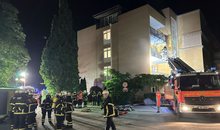
A hospital in Hamburg, Germany, catches fire, killing three patients
2025-06-01 18:32:28
Nesho: Rama's autocratic regime has not allowed free elections to take place
2025-06-01 18:10:23
Moroccan immigrant's suicide, activist: There are inhumane conditions in Gjadra
2025-06-01 17:49:32
World Bank Report, PL: Confirms that the majority of Albanians live in poverty
2025-06-01 17:23:56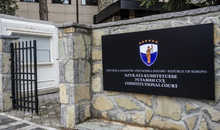

31 dead after Israeli attack near Gaza aid center
2025-06-01 16:40:30
At least 150 dead in Nigeria floods
2025-06-01 16:14:26
Flames engulf the Darëzeza forest massif in Fier
2025-06-01 15:56:41
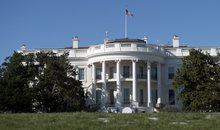
SHBA-ja i dërgon Iranit një propozim për marrëveshje bërthamore
2025-06-01 14:54:11


Moroccan immigrant commits suicide, activists protest in front of Gjadri camp
2025-06-01 13:48:17
PSG victory celebrations turn into tragedy, two dead, over 500 arrested
2025-06-01 13:26:33

Kosovo-Albania arms trafficking, Tirana Court leaves 8 arrested in prison
2025-06-01 12:41:11
Foreign worker dies at work, engineer of construction firm arrested in Tirana
2025-06-01 12:20:27
Car hits motorbike, 25-year-old dies in Bilisht
2025-06-01 11:56:56

Why doesn't the Vatican recognize the state of Kosovo?
2025-06-01 11:22:07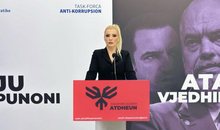

22-year-old arrested in Durrës, cocaine doses found hidden in his car
2025-06-01 10:40:20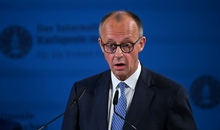
Merz to meet Trump in Washington on June 5
2025-06-01 10:18:13
Today, June 1st, is World Children's Day.
2025-06-01 10:01:13
Foreign exchange, the rate at which foreign currencies are sold and bought
2025-06-01 09:47:21
After the elections, the "fiscal peace" ends, the "war" begins
2025-06-01 09:24:30
PSG defeats Inter, grabs Champions League trophy
2025-06-01 09:08:08

Horoscope, what do the stars have in store for you today?
2025-06-01 08:40:10
Serious in Tale, Lezha! 57-year-old man executed in the yard of his apartment
2025-06-01 08:25:55
Temperatures up to 31 degrees Celsius, weather forecast
2025-06-01 08:15:33
Morning Post/ In 2 lines: What mattered yesterday in Albania
2025-06-01 08:01:33
Anemia increases in the population
2025-05-31 22:18:38
Elections, Noka: A farce took place in Albania on May 11
2025-05-31 21:44:55


Jola Hysaj after the result in Durrës: The vote may have been alienated
2025-05-31 20:37:16

He was shot by his compatriot in Podgorica, the young 23-year-old Albanian dies
2025-05-31 19:58:13

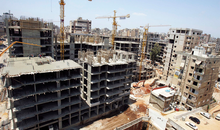
Ndërtime pa siguri? Humb jetën punëtori boshnjak në Tiranë
2025-05-31 18:59:42


Russian attacks kill at least seven people in Ukraine
2025-05-31 17:35:43
Study: Half of the world experienced one more month of summer in 2024
2025-05-31 17:10:40

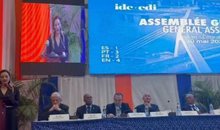


Tragedy in Germany, small plane crashes into a residential complex, two dead
2025-05-31 15:24:43


Wanted by German authorities, 22-year-old arrested at Morina border crossing
2025-05-31 14:39:44

Threat or protection? Rama's stances towards SPAK spark contradictions
2025-05-31 13:54:59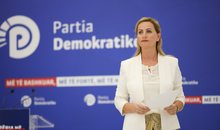

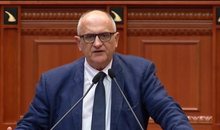
The poisoning of children in Gramsh, proof of the destruction of state control!
2025-05-31 12:59:40

Car full of contraband cigarette cartons, 48-year-old arrested in Kapshtica
2025-05-31 12:30:43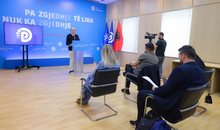


All the people (patronage) police
2025-05-31 11:59:12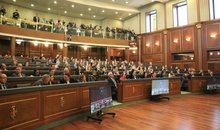
Dështon edhe seanca e 24-t, nuk ka konstituim të Kuvendit të Kosovës
2025-05-31 11:39:38

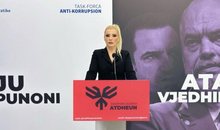

High flow of travelers at the Morina border crossing during the weekend
2025-05-31 10:20:31
Berisha will participate in the EPP Political Assembly in Brussels on June 3-4
2025-05-31 09:58:13

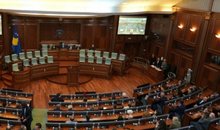
Today is the 24th attempt to constitute the Assembly in Kosovo
2025-05-31 08:58:30
Horoscope, discover the star forecast for your sign
2025-05-31 08:39:28
Weather forecast, how temperatures will vary throughout the day
2025-05-31 08:19:07
Morning Post/ In 2 lines: What mattered yesterday in Albania
2025-05-31 08:01:14



Bomb alert in a hotel in Tirana, what the police discovered
2025-05-30 22:05:17
The myth of 'eight hours of sleep' is debunked, here's what you need to consider
2025-05-30 22:01:55

For 7 million Lek maintenance pension, the bailiff seizes his house
2025-05-30 21:42:00



Video/ Bomb alarm in the parking lot of a hotel in Tirana, the police react
2025-05-30 20:59:35
Shots fired in Durres, one injured
2025-05-30 20:50:12
Bomb alert in the parking lot of a hotel in Tirana!
2025-05-30 20:25:46


